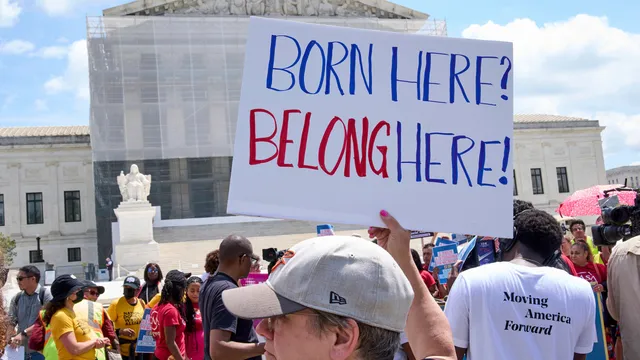
Supreme Court prepares to rule on Trump's birthright citizenship order
2025-06-28 12:46- The Supreme Court is concluding a term that has featured significant cases, including President Trump's bid on birthright citizenship.
- Trump's executive order aims to deny citizenship to children born in the U.S. to undocumented immigrants, a move blocked by lower courts.
- The upcoming ruling could set vital precedents concerning the power of federal judges and the constitutionality of presidential directives.
Express your sentiment!
Insights
In the United States, the Supreme Court is concluding its term with critical rulings, including the pivotal case involving President Donald Trump's executive order on birthright citizenship. This executive order aims to prevent U.S.-born children of undocumented immigrants from automatically receiving citizenship at birth, a significant shift from longstanding constitutional practices. Lower courts have consistently blocked this policy, leading Trump to appeal to the Supreme Court, seeking clarification on the legality of such nationwide injunctions that override his directive. The Court’s deliberations may not only impact the specific ruling on citizenship but also clarify the bounds of federal judicial authority over presidential policies. During arguments, conservative justices expressed concerns surrounding the expanding scope of nationwide injunctions issued by lower courts, which have emerged as a contentious issue for the Trump administration. The outcome of this case is highly anticipated, as it represents the Supreme Court's first major ruling during Trump’s second term and might influence future litigation involving his administration's policies. Compounding this judicial drama is a backdrop of broader political tensions, particularly surrounding Trump's immigration agenda. The administration has faced several challenges in enforcing its policies due to multiple judicial blocks, which Trump and his allies have characterized as politically motivated. The upcoming ruling could set a precedent that either reinforces or restricts the power of lower court judges to halt presidential directives. In addition to birthright citizenship, the Court is also considering cases that engage issues of religious rights in education and challenges to legislation concerning age verification for accessing online pornography. These cases reflect a culmination of societal divisions over race, gender, and education, signifying a potentially transformative moment in American jurisprudence. As the justices prepare to provide their final opinions, the judicial landscape will be closely scrutinized, with implications that reach far beyond this particular term. The decisions handed down could realign interpretations of constitutional rights and the judicial framework that governs them, echoing into future political events for years to come.
Contexts
The history of birthright citizenship in the United States traces its roots back to the foundational principles of American democracy and the Fourteenth Amendment, which was ratified in 1868. This amendment explicitly states that "all persons born or naturalized in the United States, and subject to the jurisdiction thereof, are citizens of the United States." This legal provision was designed to ensure that former slaves, who had been denied citizenship under antebellum laws, would be granted full citizenship rights and protections. Over the years, the interpretation of birthright citizenship has evolved, yet the core principle has remained consistent, reinforcing the idea that citizenship is tied to place of birth rather than the status or nationality of one's parents at the time of birth. In the late 19th and early 20th centuries, birthright citizenship was further solidified in American law through various court rulings. The landmark case of United States v. Wong Kim Ark in 1898 confirmed that children born in the U.S. to Chinese immigrants were entitled to citizenship, reinforcing the notion that the Fourteenth Amendment's guarantee of citizenship applied broadly, even to groups that faced significant discrimination. Such rulings helped to clarify and affirm the rights of individuals born within U.S. borders, setting an important precedent for future generations and illustrating the importance of citizenship as a social equalizer in a diverse nation. However, the concept of birthright citizenship has faced challenges over the years, particularly in the context of immigration debates. In contemporary discussions, there has been significant political discourse around the legitimacy of birthright citizenship, especially concerning children born to undocumented immigrants. Critics argue that the interpretation of the Fourteenth Amendment needs to be revisited, while proponents defend the longstanding practice as a fundamental American value. Numerous proposals have been made to amend the Constitution or pass legislation that would limit or redefine birthright citizenship, but thus far, none have succeeded in altering the fundamental tenets established over a century ago. The future of birthright citizenship in the United States remains a point of contention. As demographic shifts and immigration patterns continue to evolve, so too will the debates surrounding citizenship. The idea that being born on U.S. soil automatically confers citizenship is deeply ingrained in American identity and values, yet it faces ongoing scrutiny and legal challenges. The significance of birthright citizenship extends beyond legal status; it serves as a crucial aspect of national identity, reflecting the principles of inclusivity and opportunity that underpin American society. The ongoing discourse will likely play a pivotal role in shaping the legal landscape of citizenship for future generations.